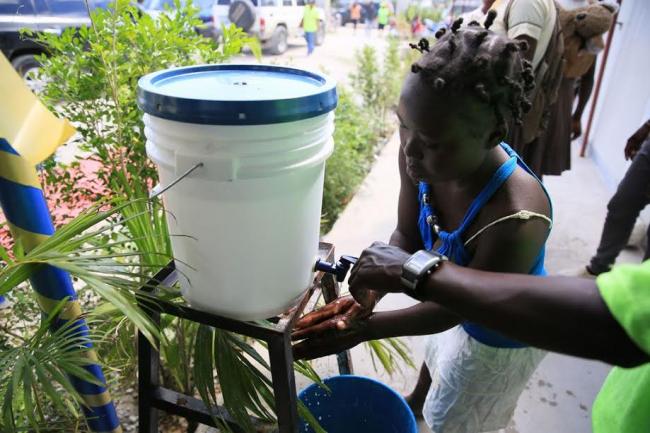09 Dec 2016, 12:04 pm Print

In an interview with the UN News Service, Dr. David Nabarro, a UN Special Advisor, highlighted the recent massive recent vaccination campaign, backed by the Pan American Health Organization (PAHO)/ UN World Health Organization (WHO), that reached 729,000 vulnerable Haitians and the increase in 'rapid response' teams, which has had a positive impact in stopping outbreaks of the disease in its tracks.
“I want enough cash in the bank so that we can be sure of being able to have this response capacity right through into 2018. Then, we can really get this outbreak right down, numbers really small, and then if we combine it [efforts to improve] water supplies and sanitation for every Haitian, cholera will go,” he underscored.
Dr. Nabarro noted that in August of this year, it became clear that the number of people with cholera in Haiti was actually larger than it had been last year. Because of shortages of funding, the number of teams that could respond rapidly when individuals were reported to have cholera-type symptoms had really dropped from about 70 to around 30.
“With a situation like that, where you can't respond quickly to a person who is sick, you get more people in the vicinity of the sick person also being ill with diarrhoeal disease and probably with cholera,” he said.
The UN borrowed resources internally to increase the number of rapid response teaAs a result, the number increased from 32 in April to 88 on Wednesday and the majority of people, who were reported as being sick with watery diarrhoea and suspected cholera, can now get treated within 48 hours of their illness being reported.
When Hurricane Matthew hit Haiti in early October, the UN became extremely concerned that there would be an upsurge in the number of people sick with cholera because the storm damaged sanitary facilities and sewage leaked into the places from which people obtained their drinking water. This prompted the urgent delivery to Haiti of 1 million doses of the cholera vaccine and the massive and efficiently executed vaccination campaign of vulnerable communities in the storm affected areas.
Although the vaccine is not a 100 per cent effective, if combined with other interventions, such as chlorination of water supplies and intensive education, the impact on cholera can be dramatic, he said, adding that the UN is looking to vaccinate everyone in the country, ideally with two doses.
The number of people with cholera is below the levels recorded during this period last year and the year before. “The way that's done is through having finance,” he explained. “You can't run an effective cholera response without dependable cash.”
“You can then provide the five different inputs necessary for controlling an outbreak: rapid response, effective treatment, vaccination, chlorination of water supplies, and really strong public education and involvement,” he concluded.
The Special Adviser's call for scaled-up funding comes just days after UN Secretary-General Ban Ki-moon apologized to the people of Haiti, expressing deep regret for the loss of life and suffering caused by the country's cholera epidemic, and drawing on his report A new approach to cholera in Haiti, outlined the way forward including immediate steps to stem the outbreak and long-term support for those affected – while also highlighting the need for adequate funding of the proposal.
Haiti has been dealing with a cholera outbreak since October 2010, some nine months after it suffered a devastating earthquake. The outbreak has affected an estimated 788,000 people and claimed the lives of more than 9,000. Concerted national and international efforts, backed by the United Nations, have resulted in a 90 per cent reduction in the number of suspected cases.
While the number of those affected remains high, and recent outbreaks – partly heightened by the impact of Hurricane Matthew – show the continued vulnerability of the population to the disease, UN officials have said the challenge is not insurmountable.
Photo: PAHO
- Coffee and tea: This everyday drink may help protect your brain from dementia
- Happy Chocolate Day! The sweet secret behind chocolate’s hidden benefits
- Cambridge study finds menopause affects memory, mood, and sleep
- Nipah horror returns: WHO confirms death of a woman in Bangladesh
- Falling birth rates blamed on COVID shots? New research says think again





-1763561110.jpg)
